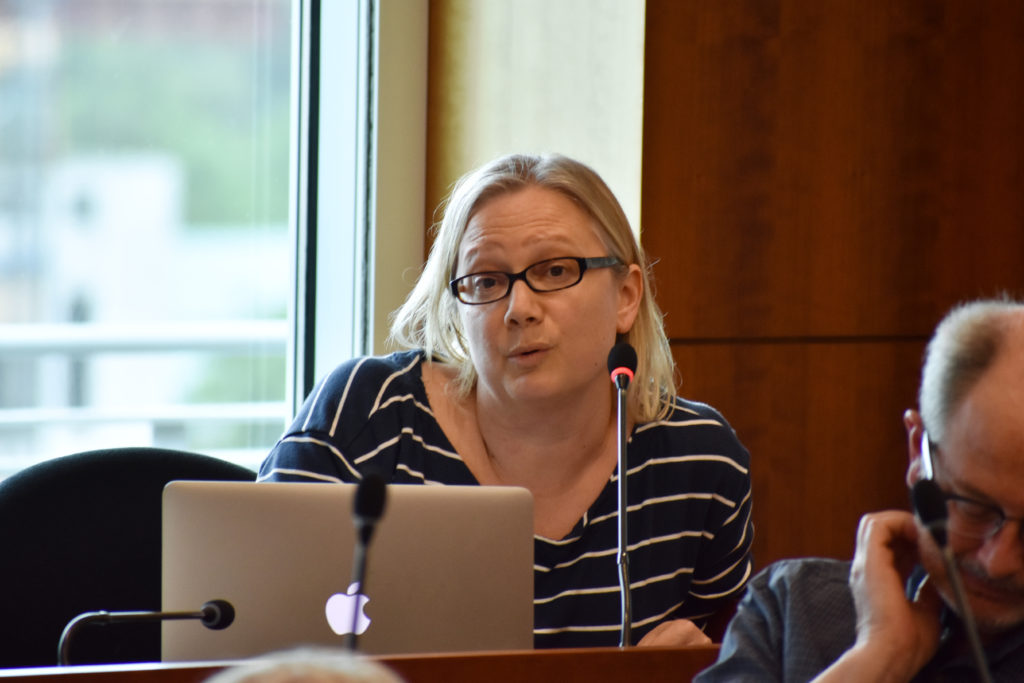About a year after officials stopped automatically including a voluntary library gift on students’ bills, faculty are urging officials to increase funding for GW’s libraries.
The Faculty Senate’s libraries committee released a report last month finding that several campus libraries lost more than 90 percent of their revenue from student donations after trustees voted in February 2018 to change the voluntary student gift from an opt-out to an opt-in structure. The funding gaps could cause libraries to cut resources like database subscriptions and books, reducing the quality of student and faculty research, according to the report.
“We recognize and support the reasoning for the change in student fee structures; however, these fees funded items that directly contributed to student experience and the loss of this revenue will impact student experience,” the report states.
Students were previously required to opt out of paying the $100 library gift. The new system has caused the number of students paying the gift to Gelman, Eckles and the Virginia Science and Technology Campus libraries to drop about 95 percent – amounting to about $1.2 million – according to the report.
Geneva Henry, the dean of libraries and academic innovation, said the three libraries received $300,000 this academic year to offset a portion of the drop in revenue. She said the aid will be increased annually in increments of $125,000 until 2022, peaking at $675,000.
“The Faculty Senate Committee on Libraries has expressed concern about the significant loss of funding while recognizing that the new model is a positive change for students,” Henry said in an email.
She said the libraries use gift funds to pay for upgrades to furniture and study tools like electrical outlets, desks, whiteboards and computers. Henry said that before the donation model switched, library officials planned to use the funds to increase student seating and create “flexible” places for studying and teaching over the next five to 10 years.
The reduction in funding comes amid rising prices for library materials like database subscriptions and budget cuts for non-academic units of 20 to 25 percent that began in 2017, she said.
“Although collections, purchase of books and electronic resources were exempted from these reductions, the extreme inflation in journal and database subscriptions results in decreased purchasing power every year,” Henry said.
Holly Dugan, the chair of the libraries committee and an associate professor of English, said GW’s libraries will purchase fewer resources each year that the lost funds are not fully replaced.
“Gelman Library is one of the most used buildings on our campus, so we were really concerned about what that might mean in years going forward, because we’re going to see a compounding of this shortfall,” Dugan said.
Dugan said student donations to the Jacob Burns Law Library experienced the sharpest decrease, dropping 99 percent compared to last academic year. The law library took in less than $1,000 in student fees this year compared to about $68,000 last year, she said.
Scott Pagel, the associate dean for information services and the director of the law library, said library officials purchased fewer books and databases this year because of the switch to the opt-in system. The library has not received any additional funding from the law school to compensate for the loss of funding, he said.
“The budget of the law library has been reduced in recent years, but not by this much and not to the degree that we have been unable to continue operations or provide services as usual,” Pagel said in an email.
Dugan, the chair of the libraries committee, said 15 students in the School of Medicine and Health Sciences this academic year chose to pay the voluntary gift to the Himmelfarb Health Sciences Library. She said the funding had been used in the past to pay for subscriptions to two academic journals, AccessMedicine and DynaMed Plus.
“That impact of student fees in Himmelfarb went to fund subscriptions to those two publishing journals, and that’s going to impact a broader band of students who use that,” she said.
Students are currently still able to access the two journals through Himmelfarb Library.
Dugan said committee members have proposed a few steps to improve the financial situation of the University’s libraries, asking officials to allocate funding to libraries to make up for the loss in revenue from the gift and to review other universities’ methods for handling budget difficulties. Members agree that the University should not return to the opt-out system, she said.
“None of us think returning to the old fee model makes sense,” Dugan said. “What we really want to see moving forward is having our library system fully funded in the ways that it needs to be, given its centrality to the academic mission of GW.”








